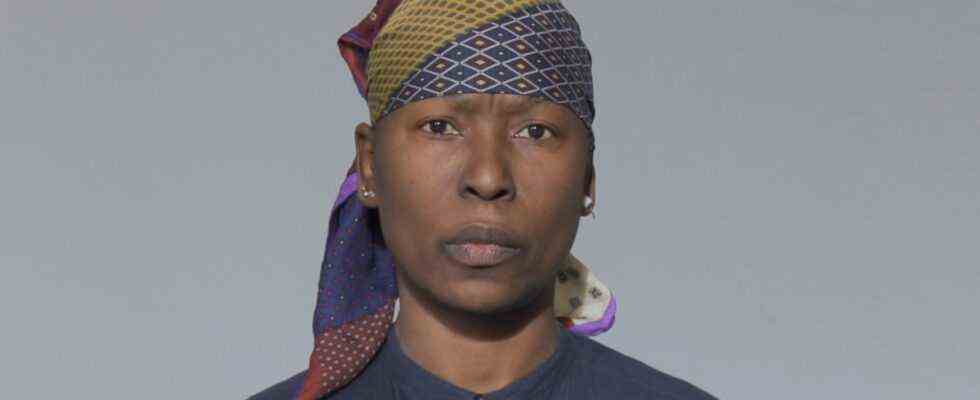While the music continues as if it were a single, never-ending song, while the musicians operate their traditional instruments and also an electric guitar with stoic virtuosity, while everyone and especially the two women in this black ensemble sing in shimmering colors the white man across the room. He wears a tailcoat and boots, otherwise he’s naked. At this moment Peter van Heerden is sheer irritation, is power and violence, a foreign body. He goes into the adjoining room, which is also full of the audience, puts on the frame of a hoop skirt, puts on white make-up, puts on a courtly wig, becomes completely a bogey, at this moment is a judge, Queen Victoria and Cecil Rhodes, who the area, which was named after him as a colonial state of Rhodesia and is now Zimbabwe, subjugated. With a gracious gesture he turns to the audience, sings, very wrongly, “God save the Queen”, and Nora Chipaumire stares at him, unmoved, but with seething anger inside her.
The “Spielart” festival in Munich began on October 22nd, the largest international theater festival since the lockdown. Sophie Becker, its manager, was lucky; The festival has been taking place every two years since 1995, most recently in autumn 2019, when no one suspected anything about Corona, and right now, at a time when the audience can actually come back for the most part, and so can the artists from remote continents. Nevertheless, it was probably difficult to put together the program with around 40 productions from India and many African countries, from New York and Tokyo, from Basel and Manila, from Beijing and Rio de Janeiro. Some groups – “Spielart” is a festival of the independent scene – had disbanded in lockdown, others stopped working, and still others could not yet travel. Now there are also some hybrid formats, film and digital. In essence, however, according to Becker, it was already the festival that she wanted to hold.
A twelve-part opera with the sound of Africa
“Spielart” has always been decidedly international, but in the past two editions, Sophie Becker, initially as co-director alongside Tilmann Broszat and now the sole boss, has sharpened the focus on non-European theater. In addition to topics that theater in this country also deals with – gender discussion, gender role models, integration and inclusion – there is also the theatrically exciting debate about colonialism and its consequences, about neo-colonialism and the exploitation of many countries in Africa, Latin America and Asia by multinational companies. And Nora Chipaumire with her production “Nehanda”, which co-opened the festival, fits in wonderfully.
Born in 1965 in what was then Rhodesia (Zimbabwe became independent in 1980), Chipaumire has been working internationally for more than 20 years. One of their latest ventures was, loosely translated, the title “Hashtag Punk, One Hundred Percent Pop, Star Nigga”, so you can already guess what’s in store for you. When the production is presumably finished in 2023, “Nehanda” will be a twelve-part opera with the sound of Africa, full of anger and the hope of real African emancipation. Three parts can be seen in “Spielart” in the Haus der Kunst, the story behind is the struggle of the locals against Rhodes and the British colonial rulers, which has a secret: Nehanda, a kind of spiritual principle, sought out as a medium Charwe Nyakasikana, who in 1896 Incited rebellions against the foreign rulers, captured by them and hanged cruelly. Based on the trial files, Chipaumire drafts the indictment and the idea of cultural self-determination with insane force by means of a staged concert. In one room there is a photo of the rebels on the wall, in the other a picture of the Berlin conference, at which the remnants of Africa were sold to the European powers in 1884. And anger reverberates in both rooms: “Pay us for the harm you have caused us.” Paid for what you did to us.
After 13 productions in the first seven days of the festival, there is no chance of even remotely reproducing the abundance of what is on offer. What is astonishing is that a single performance is crap. The others are either brilliant, such as “Madama Butterfly” by Satoko Ichihara, which transfers the motifs of Puccini’s opera to contemporary Japan. Others are immensely enlightening or even completely touching like the solo by Sorour Darabi, a trans person from Iran who, with fragile ruthlessness, describes the dilemma of wanting to be perceived normally, but always has to choose between his being, playing with this and that Talk about.
There is a dance piece here that explores the border between Mexico and the USA with somnambulistic nightmare (“Danza y frontera”), one in which the incredibly funny residents of the favelas of Rio de Janeiro have physically mind-boggling stories of the longing for individuality and community spirit are told (“Cria”), one learns (very laboriously) of the overexploitation of a Japanese company in Chile, where the ore mining poisons the country and the people (“How to turn to stone”) and sees five men who in ludicrous choreography between the Gender change (“L ‘Homme rare”). Above all, however, one is repeatedly confronted with the inadequacy of the Central European-centered view and is given one’s own clichés by self-confident, self-determined artists.

